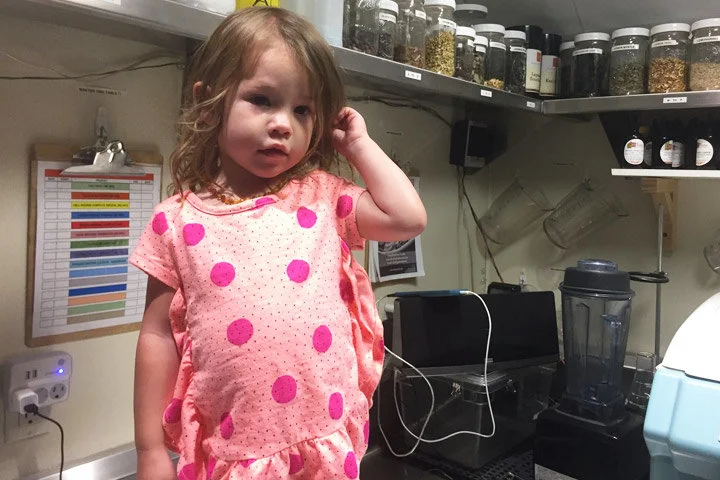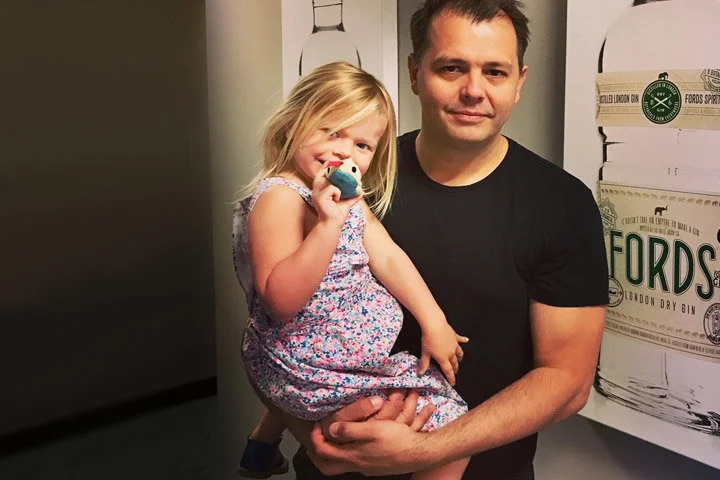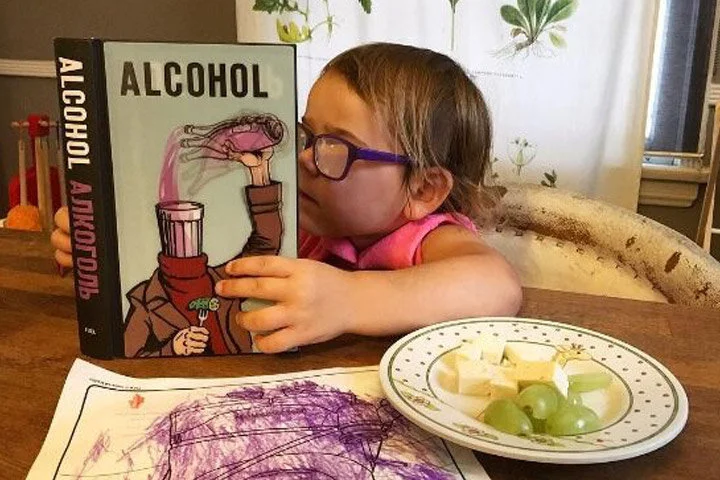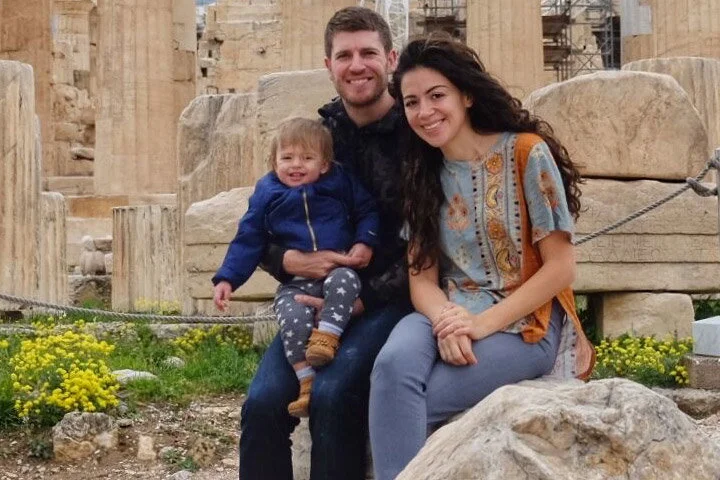Yes, You Can Be a Bartender and a Parent.
Nov. 9, 2017. Originally published in Liquor.com.
First comes cocktails, then comes marriage. Then comes a bartender with a baby carriage.
The contemporary craft cocktail movement as we know it is around 17 years old, dating to the opening of seminal bars like Death & Co, Employees Only, Milk & Honey, Pegu Club and PDT. But as the scene has matured, so too have its pioneers, many of whom are now married with families and grappling with how to balance parenthood in an industry that’s not always compatible with a healthy home life.
Natasha David and Elliot Oertel (image: Eric Medsker)
“I was putting in liquor orders when I went into labor,” says Natasha David, the co-owner of Nitecap. David was six months pregnant when she moved Nitecap to a new location in New York’s Lower East Side and was regularly putting in shifts that ended at 3 a.m. Her son, Elliot, turns 1 later this year.
Christy Pope, who co-created Midnight Rambler in Dallas with her partner, Chad Solomon, tells a similar story. “While I was pregnant, we were in the process of opening our bar,” she says. Pope found out she was expecting in May; Midnight Rambler opened in October. Coco Pope-Solomon, now 2 years old, was born the following January. “I was working 14-hour days. It was very grueling.”
Christy Pope’s daughter, Coco Pope-Solomon (image: Christy Pope)
In some ways, being a parent in the bar industry is the same as being a parent who is a lawyer, dentist or small-business owner. There are babies that cry for dawn feedings, toddlers with early bedtimes and small children who always seem to pick up the sniffles. On one side, there are play dates, doctor’s appointments and scraped knees; on the other, conference calls, vendor meetings and payroll deadlines.
But that’s where most of the similarities end. Few other industries have endless access to alcohol, regular interactions with flirty strangers, late-night shifts that end at 4 a.m. and a culture that expresses friendship in rounds of shots. Industry veterans admit that it can be a struggle.
Simon and Juliet Ford (image: Simon Ford)
“When I turn up, people want me to be the 25-year-old fun guy as opposed to the 45-year-old parent,” says Simon Ford, the founder of spirits brand The 86 Co. and father to 3-year-old Juliet.
“I have the personality that gets carried away and lives in the moment,” says Ford. “If you’re in a different city, it can take on a life of its own, and next thing you know, it’s two or three in the morning. You had a great time, and then you wake up with the guilt that you didn’t call your daughter.
“Because you’re breaking someone’s heart every time you do that,” he says. “And that is what is ultimately difficult about being a parent in this industry.”
Ford adds that when he’s home he focuses himself entirely on his family. “[Los Angeles] might be the city where I know the least about bars,” he says. “When I get home, I spend every minute that I can with my daughter.”
As for those late hours and free drinks that seem so sexy when you’re single? Not so much anymore, say bartending parents.
“For me, it has been a drastic change,” says Pope. “Chad has become more of the face [of Midnight Rambler]. He’s the one who’s able to be out and about, whereas I’m less able to do that.
“I do an equal amount of work, but I do it during the day,” she adds. “Sometimes, you miss that ability to be able to socialize and make those face-to-face connections.”
For Natasha David and her husband, Jeremy Oertel, who’s a partner at Brooklyn’s Donna and a bartender at Death & Co, childcare means organizing their schedules so that at least one of the parents is always with the baby.
“We sit down at the beginning of every week and plan out where the baby is going to be,” she says. For the past year, Oertel worked manager shifts at Nitecap so that David could stay home some nights; he also stepped in for her to approve menu tastings when she was pregnant.
Daniel Sabo’s daughter, Cordelia Barlow (image: Daniel Sabo)
“What has become really difficult is that the kid doesn’t care that you worked late last night,” says Daniel Sabo, the beverage director at the soon-to-open Hotel Figueroa in Los Angeles, says. His daughter, Cordelia Barlow, is almost 3. “The kid wakes up when the kid wakes up.”
“I don’t drink that much,” says Sabo. “I have devastating hangovers. We just generally drink less because feeling OK in the morning is so much more important.”
“I can probably count on one hand the amount of times I’ve been hungover in the mornings and had to take care of my daughter,” says PDT general manager Jeff Bell. “Two times? It’s the most difficult thing ever.”
After working an evening bar shift at PDT, Bell may be home by 5 a.m. His daughter, Delilah, who turns 2 later this year, will wake him up at 7 a.m. “She will shake me, ‘Daddy, wake up,’” says Bell. “It’s a whole new level of tired.”
But with the fatigue comes an upside, say many bartender parents: a new kind of perspective.
“I want to have an impact now,” says David. “I’m thinking about how to make things better and make my work more environmentally conscious. I would like to set a high example for [my son].”
Jeff Bell, who was named Best American Bartender at Tales of the Cocktail last July, credits fatherhood with giving him a newfound focus. He explains that parents know to put their personal needs aside for their children, which is a skill that also translates into customer service. “It’s easy to take care of very small preferences,” says Bell. “If someone wants you to add a bit of simple syrup to their Moscow Mule, that’s a very small ask.”
Delilah Bell, Jeff Bell and Auriela Nossa, from left (image: Jeff Bell)
Growing up an industry baby is already starting to show some influence.
Little Delilah has already traveled to Hong Kong, Italy, Nashville, New Orleans, Seattle and Spain. Bell and his fiancé, Auriela Nossa (who works at The 86 Co. and is also an industry parent), often take their child out to restaurants. As a result, Delilah may rank among the few toddlers who enjoys olives and mushrooms. “When we were in Rome, she ate nearly all of our spaghetti vongole. She was just devouring clams,” he says.
Ford also takes his daughter to restaurants. “We went out for sushi last night, ” he says. “She was eating the spicy rolls.”
Ford adds that during bath time, Juliet makes cocktails using water. “She’s just mimicking because that’s what kids do.”
Daniel Sabo’s daughter, Cordelia Barlow, has her own restaurant set up at home, where she serves multicourse imaginary meals that include coffee service and pretend cocktails. She even has baby chef whites and a mini jigger with a shaker. “To us, it’s important that she knows that the industry is fun,” says Sabo.
An Instagram video Sabo posted shows Cordelia taking his lunch order with a crayon. “Burger. Cheese. Ketchup. Coffee. Milk. Sugar.”
She pauses, looks at the order and then comes back to check on her table. “And everybody is good?” she asks. “And everybody is safe?” Another pause. “Now what do you want again?”




